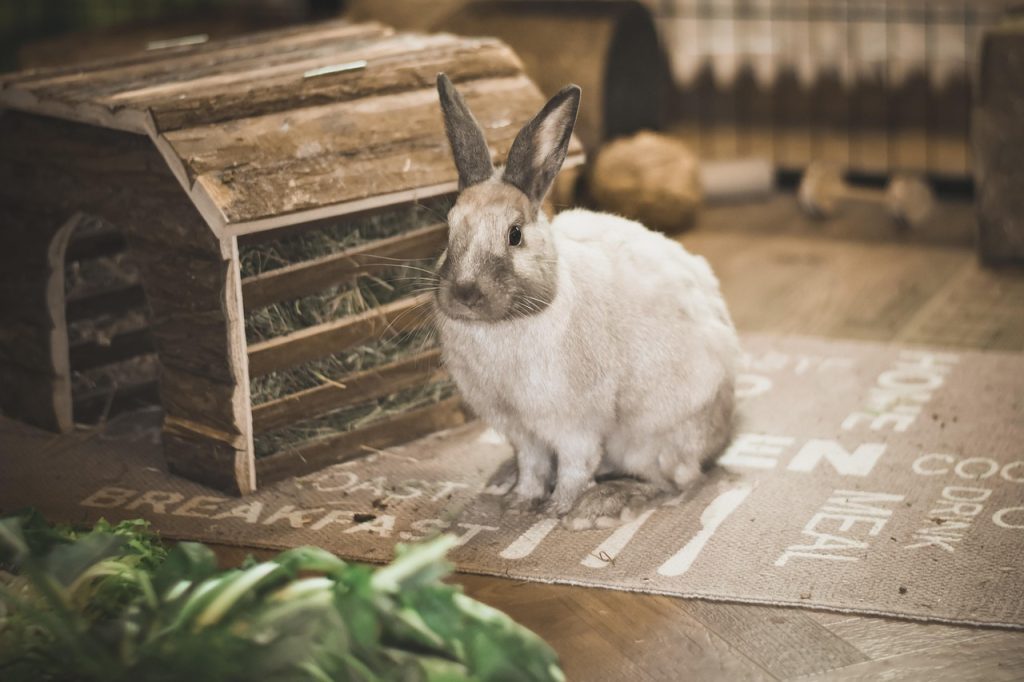Rabbits aren’t like cats or dogs. They need a strict, well-planned routine to stay happy and healthy. Skip a few steps, and you might end up with a sick or stressed-out bunny.
That’s why we’ve put together the most detailed rabbit maintenance guide you’ll find.
So, if you’re new to rabbit farming or just want to refine your care routine, this breakdown of daily, weekly, and monthly tasks will keep your rabbits thriving.
Daily Rabbit Care Tasks
Here are some daily rabbit care tasks you can do:
1. Feeding and Hydration:
Rabbits have super sensitive digestive systems, so their diet must be consistent and high in fiber.
– Unlimited Timothy Hay (or Orchard Grass/Meadow Hay)
- Hay makes up 80% of their diet, it keeps their gut moving and teeth worn down.
- Always ensure fresh hay is available. No moldy or stale hay!
– Pellets (In Moderation)
- 1/4 cup per 5 lbs of body weight (overfeeding leads to obesity).
- Choose high-fiber pellets (18-20% fiber) with no colorful bits or seeds.
– Fresh Greens & Veggies
- 1 packed cup per 2 lbs of body weight daily.
- Safe options: romaine lettuce, cilantro, parsley, bok choy, carrot tops (not too many carrots!).
- Avoid iceberg lettuce (has no nutritional value) and toxic veggies like onions.
– Clean Water
- Change water daily (bowls are better than bottles and easier to drink from).
- Use filtered or bottled water if your tap water is high in chlorine.
2. Spot Cleaning the Enclosure:
Rabbits are clean animals, but their living space needs daily tidying to prevent odor and bacteria buildup.
- Remove wet bedding, poop, and uneaten greens.
- Wipe down any urine spills (use a vinegar-water mix for disinfecting).
- Fluff up clean bedding to keep it comfy.
3. Quick Health Check:
Spend 2 minutes checking for any red flags:
- Eyes and Nose: Clear, no discharge.
- Fur: No bald patches, mats, or parasites.
- Droppings: Firm, round, and plentiful (no diarrhea or tiny, hard pellets).
- Behavior: Active, curious, eating normally.
4. Exercise and Playtime:
Rabbits need 3-4 hours of free-roaming time daily (supervised!).
- Bunny-proof the area (hide wires, block off unsafe spaces).
- Provide tunnels, cardboard boxes, and chew toys to prevent boredom.
Let them binky (jump around). It means they’re happy!
5. Bonding Time:
Rabbits are social!
Spend at least 10-15 minutes sitting with them, hand-feeding greens, or gently petting (if they like it).
Weekly Rabbit Care Tasks
This is a deeper clean check to catch problems early.
1. Full Cage/Hutch Cleaning:
Once a week, do a deep clean:
- Remove all bedding and litter.
- Scrub the enclosure with a vinegar-water solution (50/50 mix) which is safe and disinfecting.
- Dry completely before adding fresh bedding.
2. Grooming Session:
- Brushing: Short-haired rabbits = 1-2x/week. Long-haired (e.g., Angoras) = daily.
- Nail Check: Trim if they’re getting long (use cat nail clippers).
- Ear Check: Look for wax buildup or mites (consult a vet if dirty).
3. Weight and Health Tracking:
Weigh your rabbit (kitchen scale works). Sudden weight loss = vet ASAP.
- Check teeth (if comfortable), overgrown teeth need a vet trim.
Monthly Rabbit Care Tasks
This is long-term maintenance so your rabbits keep thriving.
1. Deep Habitat Disinfection
- Take apart the cage/hutch and scrub every corner.
- Sun-dry wooden toys to kill bacteria naturally.
2. Environment Safety Check
- Bunny-proofing audit: Check for any new chew hazards or loose wires.
- Seasonal adjustments:
-
- Summer: Frozen water bottles to prevent overheating.
- Winter: Extra bedding for warmth.
3. Vet and Records Review
- Schedule a check-up if due (yearly for healthy rabbits).
- Update vaccination/deworming records.
4. Diet Evaluation
- Adjust pellet portions if weight changes.
- Introduce 1-2 new safe veggies (slowly, to avoid tummy upset).
Final Thoughts
Rabbit care might seem like a lot at first glance.
But once you get into the rhythm of daily, weekly, and monthly rabbit maintenance, it becomes second nature.
Think of it like this: Consistency = Prevention.
- Stick to the daily checks, and you’ll catch health issues early.
- Keep up with weekly grooming, and you’ll avoid fur mats and overgrown nails.
- Stay on top of monthly deep cleans, and your rabbit’s home stays fresh and safe.
